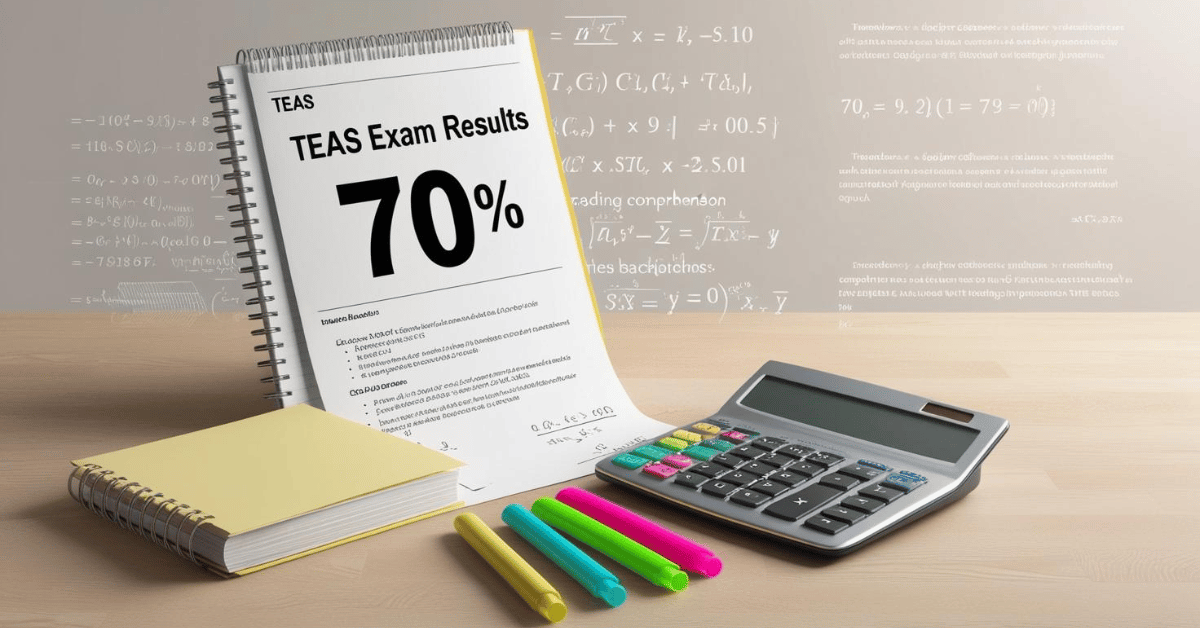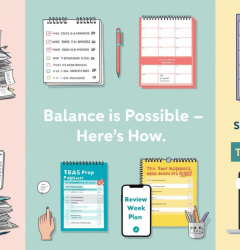- Email: hello@Tutoriffic.com
- Phone: (714) 941 0782
21 Mar

Scoring 70% on the TEAS exam can be pivotal for students aspiring to enter nursing and allied health programs. While some may see it as a solid achievement, others wonder if it’s competitive enough for their chosen school.
Admission requirements vary by institution. Some programs accept a 70% score, while others require higher scores for competitive entry. Understanding how your score measures up against program expectations, national averages, and competitive benchmarks can help you determine whether you need to improve it or move forward with your application.
This article explains what a 70% TEAS score means, how it compares to different nursing programs, and whether it’s sufficient to secure admission into your desired school.
What Does a 70% TEAS Score Mean?
A 70% on the TEAS test means that you correctly answered 70% of the total questions across all four subject areas:
| TEAS Section | Number of Questions | Time Limit | Topics Covered |
|---|---|---|---|
| Reading | 45 | 55 minutes | Key ideas, author’s purpose, comprehension |
| Mathematics | 38 | 57 minutes | Algebra, percentages, word problems |
| Science | 50 | 60 minutes | Anatomy, physiology, biology, chemistry |
| English | 37 | 37 minutes | Grammar, sentence structure, vocabulary |
A 70% score places you above average but may not be competitive for highly selective nursing programs.
Is 70 a Good TEAS Score for Nursing School?
Different nursing schools have varying score requirements. Some schools may accept a TEAS score of 70%, while others require a higher score for competitive admission.
TEAS Score Requirements by Program Type
| Program Type | Minimum TEAS Score Required | Competitive Score |
|---|---|---|
| Community College (LPN, ADN) | 55% – 65% | 70% – 75% |
| University BSN Programs | 65% – 75% | 75% – 85% |
| Highly Competitive BSN Programs | 80% – 90% | 85%+ |
💡 Tip: If your nursing program requires a minimum of 65%, then a 70% is considered a passing score. However, if you’re applying to a more competitive BSN program, you may need to retake the test for a higher score.
How Does a 70% TEAS Score Compare to National Averages?
The average TEAS score varies yearly but generally falls in the 58% – 65% range.
| TEAS Score Range | Performance Level |
|---|---|
| 90% – 100% | Advanced/Exemplary – Highly competitive for top nursing programs |
| 75% – 89% | Proficient/Above Average – Strong score for most BSN programs |
| 70% – 74% | Proficient – Meets requirements for many ADN and LPN programs |
| 55% – 69% | Basic/Average – May qualify for some programs but not competitive |
| Below 55% | Needs Improvement – Likely requires a retake |
💡 Tip: If you scored 70%, you’re above average, but improving your score can increase your chances of admission into competitive programs.
Can You Get Into Nursing School With a 70 TEAS Score?
Scoring 70% on the TEAS exam puts you above the national average, but whether it’s enough for nursing school admission depends on your specific program’s requirements and competitiveness. Some nursing schools will accept a 70% score, while others may require a higher score for admission.
Below, we’ll explain when a 70% TEAS score is acceptable when it might not be enough and what you can do to strengthen your application.
✅ A 70% TEAS Score is Acceptable If:
1. Your Nursing Program’s Minimum TEAS Score is 65% or Lower
Many community colleges, associate degree nursing (ADN) programs, and licensed practical nurse (LPN) programs set their minimum TEAS score requirement between 55% and 65%. Since your 70% is above this threshold, you would likely qualify for admission.
✔ Example: If your school requires a minimum TEAS score of 60%, then a 70% would exceed the requirement and increase your chances of acceptance.
2. Your School Uses a Holistic Admission Process
Some nursing programs do not base admission solely on TEAS scores. Instead, they consider a combination of factors, such as:
- GPA (Grade Point Average)
- Completion of prerequisite courses (biology, anatomy, chemistry)
- Relevant healthcare experience (CNA, medical assistant, volunteer work)
- Personal statement or admission essay
- Letters of recommendation
✔ Example: If your GPA is strong (3.5+), you have healthcare experience, and your TEAS score is 70%, you could still have a good chance of acceptance, even if other applicants have higher scores.
3. You Have Strong Grades in Prerequisite Courses
Nursing programs often look at your performance in key subjects such as:
- Anatomy & Physiology
- Biology
- Chemistry
- Microbiology
If you have high grades (A or B) in these courses, your 70% TEAS score may not be a deal-breaker. Some schools prioritize strong prerequisite coursework over test scores.
✔ Example: A student with a 3.8 GPA and strong science grades may still get accepted with a 70% TEAS score, especially in programs prioritising academic performance over standardized testing.
💡 Tip: If your school accepts scores above 65% and considers other admission factors, a 70% TEAS score may be good enough!
❌ A 70% TEAS Score May Not Be Enough If:
1. Your Nursing Program Requires 75% or Higher
Some Bachelor of Science in Nursing (BSN) programs and direct-entry RN programs set higher TEAS score requirements due to increased competition. Many universities require a minimum score of 75%-80% to be considered for admission.
❌ Example: If your school’s minimum requirement is 75%, a 70% score would fall short, and you may need to retake the TEAS test to be eligible.
2. You’re Applying to a Highly Competitive Nursing Program
If you’re competing for limited spots in a top-ranked nursing program, a 70% TEAS score may not be competitive enough. Competitive nursing programs often accept applicants with 80-90% TEAS scores.
| Type of Nursing Program | Minimum TEAS Score | Competitive TEAS Score |
|---|---|---|
| Community College (ADN, LPN) | 55% – 65% | 70% – 75% |
| BSN (Bachelor’s in Nursing) | 65% – 75% | 75% – 85% |
| Highly Competitive BSN Programs | 80% – 90% | 85%+ |
❌ Example: If you apply to a competitive BSN program where the average accepted student scores 82% on the TEAS, your 70% score may not be high enough to secure admission.
💡 Tip: If your program is highly competitive, retaking the TEAS and aiming for at least 75%-80% is better.
3. Your GPA is Below the Program’s Requirement
Even if a 70% TEAS score is acceptable, having a low GPA can hurt your chances of getting in. Many nursing schools require a minimum GPA of 2.5 – 3.0, and highly competitive programs require 3.5 or higher.
If your GPA is borderline (below 3.0) and your TEAS score is only 70%, your chances of getting accepted decrease.
❌ Example: A 2.8 GPA and a 70% TEAS score student might struggle to enter competitive nursing programs, as admissions committees prefer applicants with stronger academic records.
💡 Tip: If your GPA is low, consider retaking the TEAS for a higher score to improve your overall application.
What Should You Do If 70% Isn’t Enough?
If you need a higher TEAS score to qualify, consider these steps:
✔ Retake the TEAS Exam
- Check your school’s retake policy (some allow multiple attempts).
- Give yourself 4-6 weeks to study before retaking the exam.
- Identify weak areas and focus on improving them.
💡 Tip: If science or math is your weakest area, dedicate more time to those sections before retaking the test.
✔ Enroll in a TEAS Prep Course
- TEAS prep courses provide structured study plans, practice tests, and expert guidance.
- Many programs offer online or in-person options to fit different learning styles.
💡 Tip: If self-study isn’t enough, investing in a prep course can help you improve your score significantly.
✔ Consider Professional Assistance
If you’re struggling despite studying, expert help may be an option. Many students choose to:
- Hire a TEAS tutor for one-on-one coaching
- Enroll in a structured TEAS prep course
- Pay someone to take my TEAS test for a guaranteed high score
💡 Tip: If you’re short on time and need to improve your score quickly, professional assistance can increase your chances of success.
Should You Retake the TEAS If You Scored 70%?
Retaking the TEAS may be a good idea if:
✔ Your program requires a higher score than 70%.
✔ You struggled in one section (e.g., low Science or Math score).
✔ You want to improve your chances for scholarships or priority admission.
However, if 70% meets your school’s requirements, you may not need to retake the test. Instead, focus on strengthening other parts of your application (e.g., GPA, experience, personal statement).
How to Improve Your TEAS Score?
If you decide to retake the TEAS, here are some effective strategies to improve your score:
✔ Identify Weak Areas
- Review your score breakdown and focus on low-scoring subjects.
- Use practice tests to find patterns in wrong answers.
✔ Follow a Study Plan
| Study Timeframe | Focus Areas |
|---|---|
| Weeks 1-2 | Review weak subjects, take diagnostic tests |
| Weeks 3-4 | Take full-length timed practice tests, refine test-taking strategies |
| Weeks 5-6 | Identify problem areas, strengthen understanding, take final mock tests |
💡 Tip: Study at least 1-3 hours daily to see improvements in your score.
✔ Use High-Quality TEAS Study Materials
- ATI TEAS Study Guide (Official guide).
- Practice test books & apps for realistic practice questions.
- TEAS prep courses for structured learning.
💡 Tip: Don’t rely on free materials alone—many are outdated and may not reflect the latest TEAS test format.
✔ Take More Practice Tests
- Helps you get familiar with the test format.
- Improves time management under test conditions.
- Builds confidence and reduces anxiety before the real test.
💡 Tip: Take at least 3-5 full-length TEAS practice tests before retaking the exam.
Can You Get Professional Help to Improve Your TEAS Score?
If you need extra help, consider professional assistance to improve your TEAS score:
- Hire a TEAS Tutor – One-on-one sessions to improve weak areas.
- Join a TEAS Prep Course – Structured lessons and practice tests.
- Pay someone to take my TEAS test – Guaranteed high scores with professional assistance.
💡 Tip: If you must retake the TEAS, seeking expert help can increase your chances of achieving a competitive score.
Final Thoughts – Is 70 a Good TEAS Score?
A 70% TEAS score is above average and acceptable for many nursing programs, but it may not be competitive for top-tier BSN programs.
Key Takeaways:
✔ 70% is a passing score for many ADN and LPN programs.
✔ Highly competitive programs require 75%-85% or higher.
✔ Retaking the TEAS may be beneficial if your school requires a higher score.
✔ A strong GPA and application can help compensate for a lower TEAS score.
✔ Seeking expert help can improve your chances of getting a better score on a retake.
If you’re considering retaking the TEAS for a higher score, you can:
At Tutoriffic, we provide trusted TEAS test assistance to help students achieve their best scores.
💡 No matter your score, preparation and strategy can make all the difference! 🚀







